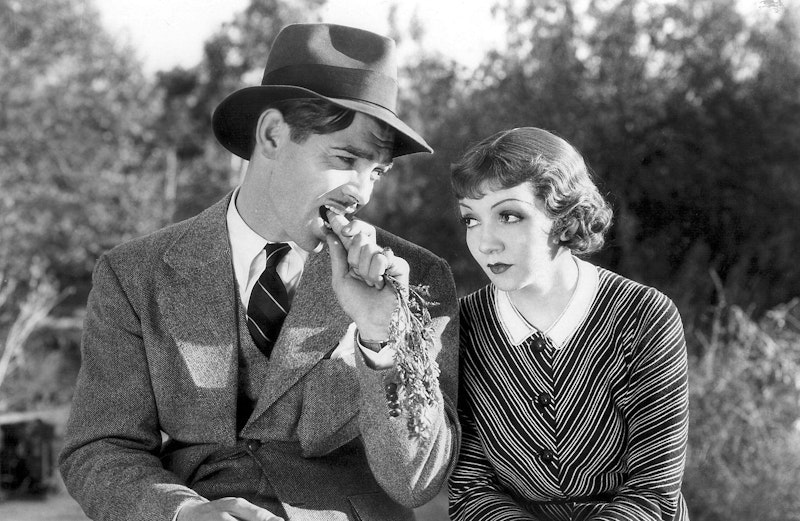Frank Capra had a gift for storytelling and visceral capturing of one’s mind. In his films, we see a mission, a purpose that moves not only the plot forward but also the emotional stability and instability of the characters. His 1934 film It Happened One Night contains all the elements that make it not only a “screwball comedy” but also a distinctly Capra production.
Claudette Colbert plays Ellen “Ellie” Andrews, a bratty and spoiled socialite who spends her time rebelling against her wealthy father. Her life is made of silly superficialities and the best way to make her father unhappy is to pick a husband that he intensely hates. She does this: King Westley is the choice and unbeknownst to her father, they elope. No matter how hard her father tries to contain her, Ellie won’t hear any reason and she (once again!) escapes.
She desperately needs to get to New York and wants to be reunited with Westley but she also has to think about her father’s detectives who are casing every literal and metaphoric joint to find her. Eluding the detectives, Ellie boards a bus to New York. Enter Peter Warne (Clark Gable), a fired journalist, now drunk and jobless, and most importantly without a story to sell. Peter and Ellie share a seat on the bus, at first reluctantly. As the journey progresses, Peter realizes who Ellie really is, and thinks this is the biggest scoop that’ll get him his job back as well as inject a jolt (not to mention, cash) to his crumbling career.
Just like in most screwball comedies, the pair feign hatred for one another, but are completely attracted to each other. Peter has Ellie’s number and doesn’t mince words. She’s a phony, a girl unable to cope with the reality of how the rest of America actually lives or survives.
Capra has a gift of blending social classes together and creating humorous tension. This is especially true in many scenes on the bus, where most of the people are either poor or middle-class. People that have to earn a living, or else all will fall apart. In one scene, a young boy starts to scream for help because his mother has lost consciousness. He’s disoriented and Ellie’s struck by this. She offers some money (which turns out to be Peter’s) for food. Peter’s not unaware of other people’s suffering but he’s mostly unmoved. After all, being low on luck is part of his life, and the contrast isn’t so stark. Ellie, however, is slowly awakened from her socialite slumber.
There are plenty of comical confusions and misunderstandings as the pair falls in love. It almost ends in a ghastly wedding to Westley, but Ellie’s father knows the importance of love, and becomes the secondary conduit of escape from the dreariness of superficial and unhappy life. The primary conduit is Peter. Both he and Ellie are changed people as the film reaches its final conclusion. Peter’s harshness goes away a little bit, but there’s always that inescapably hard charm of Clark Gable.
Gable’s Peter is an honorable man, despite his weakness for booze and generalized existential disorder. He can’t be bought in any way, and in this sense, he’s free. His own limitations are purely self-imposed, but, unlike Ellie, he’s not hovering on the surface of existence. He’s more aware of the darkness that surrounds him, while Ellie is blissfully ignorant of the world outside of her little enclave.
Yet the shift in life happens to both Peter and Ellie. As Ellie despondently gives up on Peter and gets ready to marry Westley, she denudes herself. Finally, she reveals to her father that she’s really in love with Peter, but that she’ll accept the duty of getting married to Westley. After all, she has to get married at some point to someone. Men, then, become interchangeable. They’re not singular human beings, except Peter.
Toward the end of the film, Ellie’s father poses an important question to Peter: “Do you love my daughter?” Peter evades the question repeatedly: “Any guy in love with your daughter oughta have his head examined.” He continues: “A normal human being couldn’t live with her without going nutty!” As Ellie’s father pushes further, Peter admits that he loves her: “Yes! But don’t hold that against me, I’m a little screwy myself!”
In many ways, Peter and Ellie take off each other’s metaphysical masks: something that they’ve been constantly fighting. Perhaps this means that there’s a nut for every nut, and only love can save them. Either they’ll drive each other crazy or their screwiness and eccentricity have finally been recognized through a pure act of love.

